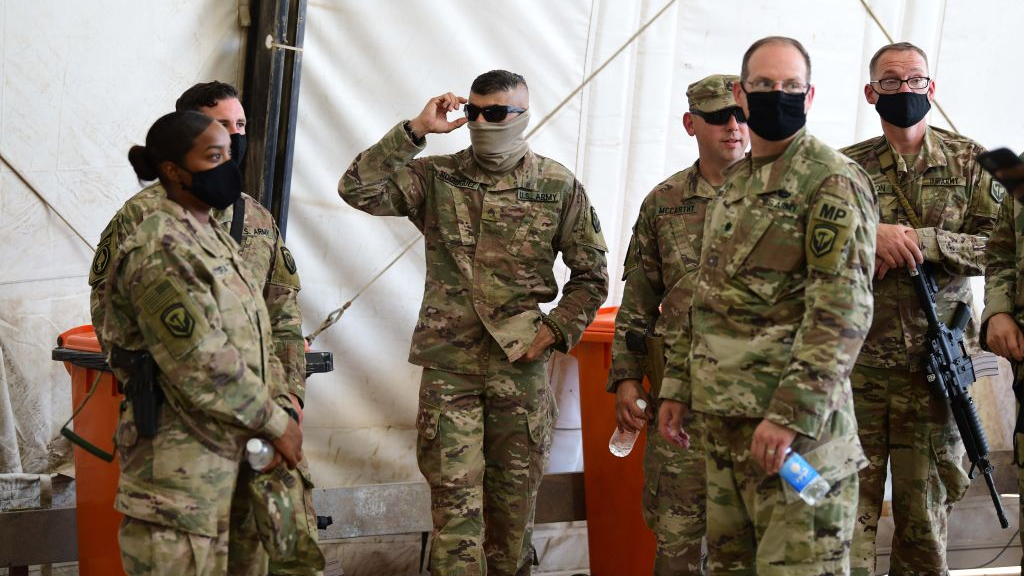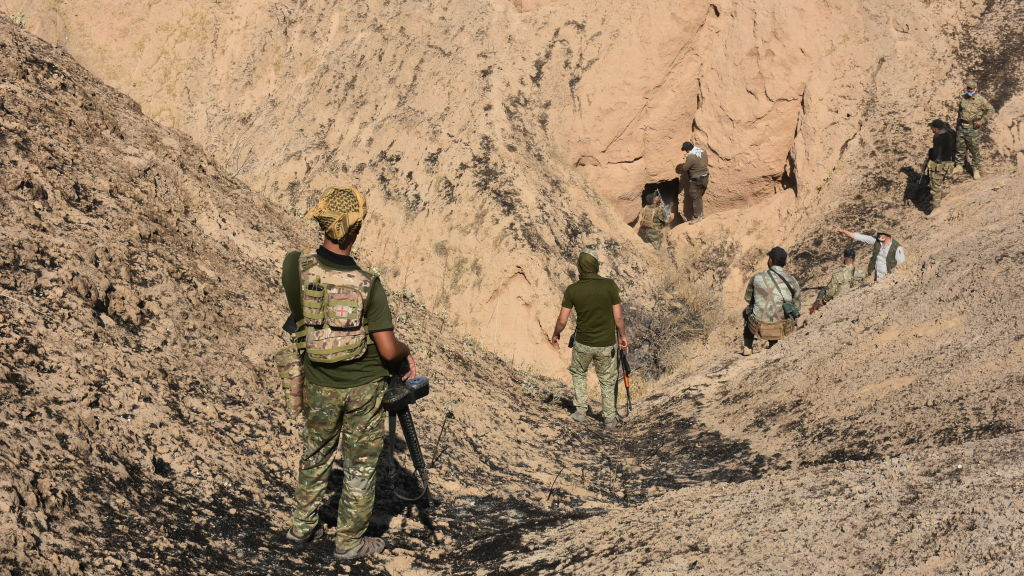
Soldiers are seen before signing documents ahead of the handover of Position 8 of the Taji Military Base to the Iraqi Army from the U.S.-led coalition in Baghdad, Iraq, August 23, 2020. /Getty Images
Soldiers are seen before signing documents ahead of the handover of Position 8 of the Taji Military Base to the Iraqi Army from the U.S.-led coalition in Baghdad, Iraq, August 23, 2020. /Getty Images
Editor's note: Hannan Hussain is a foreign affairs commentator and an author. He is a Fulbright scholar at the University of Maryland USA (2020-2022) and a former assistant researcher at the Islamabad Policy Research Institute. The article reflects the author's opinions, and not necessarily the views of CGTN.
Less than a month after U.S. Secretary of State Mike Pompeo lashed out at the Iraqi government for failing to rein in anti-U.S. militias, armed proxies are beginning to dictate the future of U.S. involvement in the country.
Their proposed truce is contingent upon Washington's full military withdrawal from Iraq by year-end, a leverage afforded by the Trump administration's own reckless America First posturing. "The factions have presented a conditional ceasefire," said the spokesperson for the Kataib Hezbollah militia in a recent statement. "It includes all factions of the (anti-U.S.) resistance, including those who have been targeting U.S. forces." By enabling non-state actors to contemplate violence and peace in equal measure, the Trump administration lays the groundwork for weakening Iraqi sovereignty instead of strengthening it.
On the diplomatic front, the costs are clear. The Trump administration appears increasingly reluctant to dismiss speculation about its embassy closure in Baghdad, signaling doubts about the militia's ceasefire declaration. "We are happy that the Iraqis are 'doing more' to provide increased security for our team on the ground there," said Pompeo at a recent briefing.
This line of argument sends the wrong signal to the government of Iraq. It suggests that acceptable government action against violent actors is determined by U.S. approval, when Iraqi politicians are yet to receive concrete guarantees on continued diplomatic cooperation and measures to prevent any rogue U.S. airstrikes from gaining force in the country.
It would also be a mistake to assume that the Trump administration knows little about Iraq's immediate governance crises. Decades of war and conditional assistance have brought the country's economy to its knees, and successive government failures have rendered the public sector resistant to reforms.
Above all, the country's lasting ideological linkages with Tehran have been a source of stability during critical flashpoints of military confrontation. But the Trump administration's insistence that Iraq-based militia are an extension of Iran's rumored destabilization scheme has generated undue skepticism of the involvement of the Iraqi state, which is often perceived as complicit.
Developments in recent weeks have shown that none of these factors have a bearing on the actual state of affairs in Iraq.
First, the U.S. and its North Atlantic Treaty Organization (NATO) partners have shown few signs of helping the Iraqi government confront Kataib Hezbollah's coercive diplomacy, by providing a condition-based timetable for U.S. troop withdrawal.
This is a significant omission because the militia ceasefire announcement on October 11 specifically calls on the Iraqi government – not Washington – to deliver on the plan of lifting U.S. boots from Iraqi soil. Recent history suggests that major decisions concerning the withdrawal of U.S. forces from Iraq, including plans to slash 2,000 troops in September, have been driven by Washington.

A third-phase military operations starts against ISIS with the participation of the Iraqi army, police force and Hashd al-Shaabi group, or Popular Mobilization Forces, in southwestern city of Kirkuk, Iraq, June 22, 2020. /Getty Images
A third-phase military operations starts against ISIS with the participation of the Iraqi army, police force and Hashd al-Shaabi group, or Popular Mobilization Forces, in southwestern city of Kirkuk, Iraq, June 22, 2020. /Getty Images
The Al-Kadhimi leadership is therefore in no position to make audacious calls on the future of U.S. military engagement in the country. The leadership's proximity to Washington is another reason why Kataib could exploit foreign policy vulnerabilities and drive a wedge between the two sovereign powers.
But the Trump administration refuses to see it that way. Its commitment to helping Al-Kadhimi bring armed militias under military control is seen as the job of a contested national leadership, as opposed to the broader backing of the U.S. coalition. NATO members, such as France, have repeatedly committed to Iraq's stability, sovereignty and territorial integrity.
Significant questions also surround the future of the alliance's peacebuilding operations in Iraq, especially in the uncertain aftermath of a post-withdrawal scenario. The armed coalition Hashd al-Shaabi has already warned that the fragile militia ceasefire "isn't open-ended" and that it could lose steam by the end of the U.S. elections. "A truce lasting longer than the end of the year doesn't make much sense. We're only giving the government more time to negotiate the [U.S.] withdrawal," said the group.
If the end goal of the Trump administration is to truly expedite the withdrawal of U.S. troops from Iraq, there should be no trouble helping the Al-Kadhimi government negotiate the withdrawal plan tactfully.
But the underlying motivations are different; they are less cooperative and more unilateral. The Trump administration appears to be exchanging hollow threats and diplomatic ultimatums with the Iraqi government, so that U.S. troops remain entitled to protection from violent non-state actors, without Washington ever being perceived as a party to a government-militia deadlock.
This shortsighted military calculus has put other aspects of collective security on the line in Iraq. For instance, a report by the New York Times on October 18 revealed that less than 5 percent of Iraqi refugees who had helped American troops, contractors or media affiliates in the past, were actually admitted into the United States.
The numbers, which also factor members of a persecuted minority group, deliver a scathing indictment of Washington's commitment to "Iraqi sovereignty and freedom." If that is the state of affairs at present, Iraqi officials are absolutely right to question the certainty of U.S. support in the future.
(If you want to contribute and have specific expertise, please contact us at opinions@cgtn.com.)